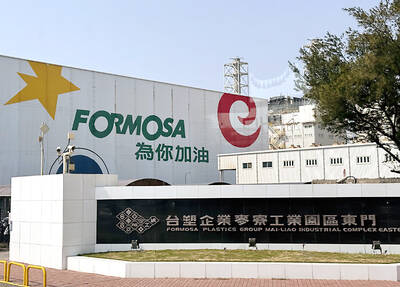Asian stocks surged after the US government proposed buying US$700 billion in bank assets and were led higher by financial and commodity companies.
Australia and Taiwan restricted the short selling of equities.
Mitsubishi UFJ Financial Group Inc and Macquarie Group Ltd rose more than 4 percent on the US Treasury’s plans to clean up bank balance sheets. Fortescue Metals Ltd jumped 25 percent after Australia’s regulator banned speculators from borrowing stocks and selling them to profit from falling prices. Bank of China Ltd (中國銀行) led Chinese shares higher after the securities regulator made it easier for companies to buy back stock.
“The positive thing about the Treasury plan is that it addresses the entire system, the bad debts and assets, rather than one by one,” said David Ng, who is buying financial shares for the US$1 billion in assets he helps manage at Hwang-DBS Asset Management Sdn in Kuala Lumpur. “The buying has been triggered by the short-selling bans. That’s been the main driver.”
The MSCI Asia Pacific Index gained 2.8 percent to 117.37 as of 5:23pm in Tokyo, extending Friday’s 5.5 percent jump.
The regional measure tumbled to the lowest in three years last week as the credit crisis forced Lehman Brothers Holdings Inc into bankruptcy. Japan’s Nikkei 225 Stock Average rose 1.4 percent today to 12,090.59.
The US dollar dropped against the yen on concern a US government plan to buy US$700 billion in troubled assets from banks will widen the country’s budget deficit.
The currency reached a three-week low against the euro before reports this week that may show tighter lending rules contributed to a drop in US home sales and durable goods orders.
The greenback also fell against the Swiss franc as two-year Treasury yields declined for the first time in three days on bets the US Federal Reserve will cut interest rates.
“Problems with the US deficit will haunt the dollar,” said Masanobu Ishikawa, general manager of foreign exchange at Tokyo Forex & Ueda Harlow Ltd. “Spending such a large amount on this rescue package will remind traders that the fiscal health of the US is set to worsen.”
The dollar fell to ¥106.05 as of 5:28pm in Tokyo, from ¥107.45 in New York late on Friday. The US currency declined to US$1.46 per euro, the lowest since Sept. 2, and traded at US$1.4575 from US$1.4466. The dollar declined to 1.0965 Swiss francs from SF1.1054. The euro bought ¥154.67 from ¥155.46.
Japan’s 10-year bonds fell on the US government’s plan to revive the country’s financial system by injecting as much as US$700 billion into markets, sending the Nikkei 225 higher for a second day.
The notes snapped two days of gains as the Nikkei 225 climbed 1.4 percent following a 4 percent increase in the Standard & Poor’s 500 Index on Friday.

EXTRATERRITORIAL REACH: China extended its legal jurisdiction to ban some dual-use goods of Chinese origin from being sold to the US, even by third countries Beijing has set out to extend its domestic laws across international borders with a ban on selling some goods to the US that applies to companies both inside and outside China. The new export control rules are China’s first attempt to replicate the extraterritorial reach of US and European sanctions by covering Chinese products or goods with Chinese parts in them. In an announcement this week, China declared it is banning the sale of dual-use items to the US military and also the export to the US of materials such as gallium and germanium. Companies and people overseas would be subject to

Taiwan Semiconductor Manufacturing Co (TSMC, 台積電) founder Morris Chang (張忠謀) yesterday said that Intel Corp would find itself in the same predicament as it did four years ago if its board does not come up with a core business strategy. Chang made the remarks in response to reporters’ questions about the ailing US chipmaker, once an archrival of TSMC, during a news conference in Taipei for the launch of the second volume of his autobiography. Intel unexpectedly announced the immediate retirement of former chief executive officer Pat Gelsinger last week, ending his nearly four-year tenure and ending his attempts to revive the

WORLD DOMINATION: TSMC’s lead over second-placed Samsung has grown as the latter faces increased Chinese competition and the end of clients’ product life cycles Taiwan Semiconductor Manufacturing Co (TSMC, 台積電) retained the No. 1 title in the global pure-play wafer foundry business in the third quarter of this year, seeing its market share growing to 64.9 percent to leave South Korea’s Samsung Electronics Co, the No. 2 supplier, further behind, Taipei-based TrendForce Corp (集邦科技) said in a report. TSMC posted US$23.53 billion in sales in the July-September period, up 13.0 percent from a quarter earlier, which boosted its market share to 64.9 percent, up from 62.3 percent in the second quarter, the report issued on Monday last week showed. TSMC benefited from the debut of flagship

TENSE TIMES: Formosa Plastics sees uncertainty surrounding the incoming Trump administration in the US, geopolitical tensions and China’s faltering economy Formosa Plastics Group (台塑集團), Taiwan’s largest industrial conglomerate, yesterday posted overall revenue of NT$118.61 billion (US$3.66 billion) for last month, marking a 7.2 percent rise from October, but a 2.5 percent fall from one year earlier. The group has mixed views about its business outlook for the current quarter and beyond, as uncertainty builds over the US power transition and geopolitical tensions. Formosa Plastics Corp (台灣塑膠), a vertically integrated supplier of plastic resins and petrochemicals, reported a monthly uptick of 15.3 percent in its revenue to NT$18.15 billion, as Typhoon Kong-rey postponed partial shipments slated for October and last month, it said. The